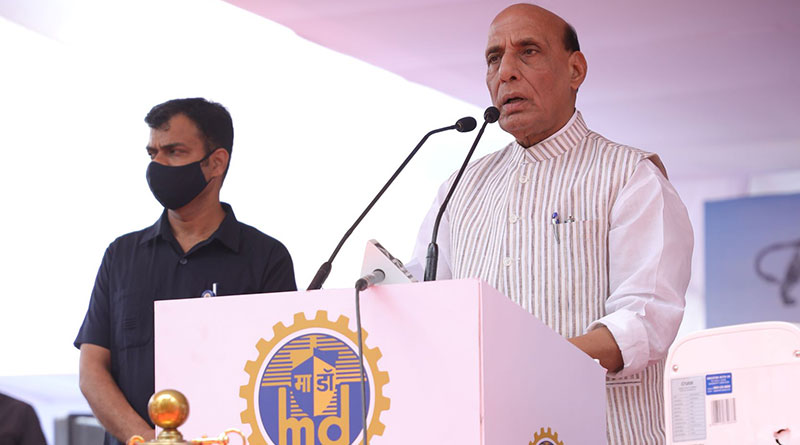The Indian Navy Launches Two Indigenous Frontline Warships—Surat and Udaygiri
Defence Minister Rajnath Singh launched two frontline warships of the Indian Navy – ‘Surat’ and ‘Udaygiri’ – at Mazagon Docks Limited (MDL), Mumbai on May 17, 2022.
‘Surat’ is the fourth Guided Missile Destroyer of P15B class, while ‘Udaygiri’ is the second Stealth Frigate of P17A class launched in MDL. Both warships have been designed in-house by the Directorate of Naval Design (DND) and built at MDL, Mumbai.
A press release from the Indian Navy stated, “The defence minister, in his address, described the warships as an embodiment of the government’s unwavering commitment to enhancing the country’s maritime capability, with focus on achieving ‘Aatmanirbharta’, at a time when the world is witnessing disruption in the global supply chain due to the COVID-19 pandemic and Russia-Ukraine conflict.”
Further, he congratulated the MDL for continued ship production activities despite the pandemic and for meeting the strategic requirements of the Indian Navy in the current geo-political scenario.
Singh said that the two warships will help add might to the Navy’s arsenal and represent to the world India’s strategic strength as well as the power of self-reliance.
“Udaygiri and Surat are the shining examples of India’s growing indigenous capability. The warships will be among the most technologically advanced missile carriers in the world, that will cater to the present as well as future requirements. In the times to come, we will not only fulfil our own needs but also meet the shipbuilding requirements of the world. We will soon realise Prime Minister Modi’s vision of ‘Make in India, Make for the World’,” he said.
The defence minister lauded the Indian Navy for responsibly discharging its duties of keeping the Indo-Pacific region open, safe and secure. “The Indo-Pacific region is important for the economy of the whole world. India is a responsible maritime stakeholder in the region. We support consensus-based principles and peaceful, open, rules-based and stable maritime order. Being an important country in this region, it is the primary objective of our Navy to keep the Indo-Pacific open, safe, and secure. The Prime Minister’s vision of Security and Growth for All in the Region (SAGAR) is based on the spirit of friendship, openness, dialogue, and co-existence with the neighbours. With that very vision, Indian Navy is effectively discharging its duties,” he said.
Since the ever-evolving security scenario in the Indian Ocean and the Indo-Pacific region would demand an even more important role for the Indian Navy in times to come, he called for devising policies which focus on bolstering the country’s presence in the region, its role during disasters, economic well-being and carrying forward the foreign policies.
The statement said that Rajnath Singh ushered in praises for the Indian Navy for playing a crucial role in carrying forward the government’s policies such as Act-East, besides strengthening relations with the Association of Southeast Asian Nations (ASEAN) and Bay of Bengal Initiative for Multi-Sectoral Technical and Economic Cooperation (BIMSTEC) countries. Recalling his recent visit to the Headquarters of United States Indo-Pacific Command (USINDOPACOM) in Hawaii, he said, they expressed their willingness to work with India, which symbolises the competence of the forces; and especially highlighted the work being carried out by the Indian Navy.
“If a country wants to safeguard its national interests, it should project its military prowess in areas far beyond the mainland. If a country aspires to become a regional or global power, it is necessary to develop a strong naval force. The government is making all efforts in this direction. We want to make a strong, secure, and prosperous India, which is recognised as a global power,” he said.
Asserting that global security, border disputes and maritime dominance have led nations around the world to modernise their military, he exhorted the public and the private sectors to make full use of the capabilities by taking advantage of the government’s policies and contribute towards making India an indigenous shipbuilding hub.
Rajnath Singh appreciated the fact that the Indian Navy has always been at the forefront in ensuring self-reliance through the manufacturing of indigenous ships, submarines etc. “Joining hands with initiatives like ‘Make in India’, Navy has given 76 percent Acceptance of Necessity (AoN), and 66 per cent cost-basis contracts to Indian vendors in 2014 and indigenisation of about 90 per cent Naval ammunition has taken place. In addition, more than two-thirds of the Navy’s Modernisation Budget has been spent on indigenous procurement in the last five financial years. Of the 41 ships and submarines ordered by the Navy, 39 are from Indian shipyards. This is a testament to the Navy’s commitment to achieving ‘Aatmanirbhar Bharat’,” he said, expressing confidence that the steps taken by the government to achieve self-reliance will give all support to their efforts.
The defence minister made special mention of Indigenous Aircraft Carrier ‘INS Vikrant’, terming it as a major milestone in the Indian Navy’s path of ‘Aatmanirbharta’. He hoped that the carrier will increase India’s reach from the Indian Ocean to the Pacific and Atlantic Ocean. The commissioning of ‘INS Vikrant’ will be a golden moment in the Indian defence history, he said.
In keeping with the Naval traditions, President NWWA (Western Region) Charu Singh and spouse of CMD, MDL Jaishree Prasad blessed and named the ships ‘Surat’ and ‘Udaygiri’ respectively. Chief of Naval Staff Admiral R Hari Kumar & other senior officers from the Indian Navy and Ministry of Defence were among the dignitaries present on the occasion.


